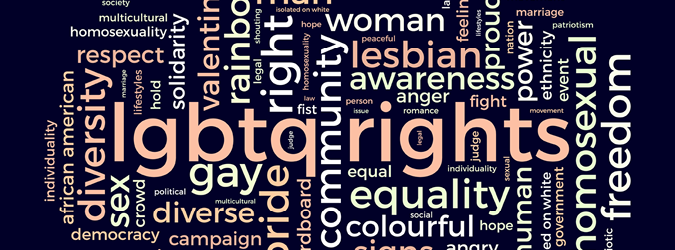Reflections on Coming Out Day: A Chronology of the LGBTQ+ Law Section
10.11.2024

October 11th is National Coming Out Day, an annual observance that supports living authentically and raises awareness of the LGBTQ+ community and its fight for equal rights. This day of awareness provides an opportunity to look back at how the New York State Bar Association has helped advance LGBTQ+ rights in New York and beyond.
In the early 2000s, same-sex marriage was not only a national matter of concern but a key issue that the association was grappling with. In 2003, the U.S. Supreme Court held in Lawrence v. Texas (539 U.S. 558 (2003)) that states could not criminally punish adults for engaging in private, consensual sodomy, thus overturning its 1986 decision in Bowers v. Hardwick. That same year, the association’s House of Delegates, the policy-making arm of the organization, approved the formation of a Special Committee to Study Issues Affecting Same-Sex Couples. The Special Committee’s goal was “to explore legislative or private legal solutions to the problems raised by the Association of the Bar of the City of New York report [entitled ‘Marriage Rights of Same-Sex Couples in New York’], and report back to the House of Delegates with concrete recommendations.”
The following year, the Special Committee issued a comprehensive 380-page report that analyzed the legal issues faced by same-sex couples. Elizabeth Cooper, a member of the Executive Committee of the LGBTQ+ Law Section and a professor at Fordham University School of Law, served as the reporter for the Special Committee. Professor Cooper, the only openly LGBTQ+ person on the committee, recalled that several members questioned why the association was getting involved in marriage equality. A minority of the Special Committee deemed the issue a matter of social or public policy and argued that the association should abstain. Their position was memorialized in the report as follows: “We need not involve ourselves in the larger social policy issues.” However, a majority of the Special Committee recommended that the Legislature enact some form of legislation granting legal recognition to same-sex couples with the same rights and responsibilities of marriage but fell short of recommending same-sex marriage.
In 2005, the House of Delegates adopted a resolution in line with the Special Committee’s report calling for legal recognition of same-sex couples via civil union, domestic partnership or marriage. Although not a complete victory, the House of Delegates rejected a proposal to abstain on the issue (58-114), but also voted down a “marriage only” resolution by a close vote of 86-82.
Following the disappointing decision by the New York Court of Appeals in Hernandez v. Robles (7 N.Y.3d 338 (2005)), which held that the New York Constitution does not require same-sex marriage, the association formed a second Special Committee in 2008 named the Special Committee on LGBT People and the Law. That committee was the precursor to our modern-day LGBTQ+ Law Section.
Michele Kahn, of Kahn & Goldberg in Manhattan, served as chair of the second Special Committee. Professor Cooper served as a reporter again, this time with Hunter T. Carter, a partner at ArentFox Schiff. The new Special Committee quickly got to work, and expectations were high. Kahn recalled some advice former New York State Bar Association President Bernice Lieber gave to her: “You better not fail!”
After a follow-up study, the committee issued a 173-page report in 2009 recommending “marriage only” for same-sex couples. One of the highlights of the 2009 Report is as follows:
“Legal marriage has an exalted status, and a deliberate choice of civil unions or domestic partnership has no rational or legitimate basis where equal rights are intended. In light of the history of discrimination suffered by lesbian and gay persons, such other statuses echo the “otherness” long-experienced by these communities, and would reinforce that couples in same-sex relationships are second-class citizens.
“Accordingly, the association should continue to advocate for full equality of legal marriage rights, but abandon its support for civil unions or domestic partnerships, as full equal marriage rights cannot be conveyed by a status different from and inferior to legal marriage. The Domestic Relations Law should be amended to permit same-sex couples to marry.”
To persuade the House of Delegates to adopt the second Special Committee’s marriage-only resolution, Kahn, Cooper and Carter lobbied Delegates while wearing buttons that read “Ask Me About Marriage.” Kahn explained that “[p]eople didn’t realize that the inability of same-sex couples to marry denied them the legal rights that legally married spouses took for granted, such as being able to visit your loved one in a hospital or inheriting property on the death of the other partner even in the absence of a will, and a light bulb went off in people’s heads.” At the June 2009 meeting of the House of Delegates, a marriage-only resolution passed, and the association threw its weight behind marriage equality.
The association sent a memorandum in support of a pending bill in the New York State Legislature to amend the Domestic Relations Law to provide same-sex couples with the same opportunity to enter into civil marriages as opposite sex couples. (Of note, the bill also provided that no member of the clergy could be compelled to perform any marriage ceremony.) At a 2011 press conference, former New York State Bar Association President Stephen P. Younger argued: “Without the right to marry, same-sex couples find it difficult, or literally impossible, to navigate legal issues that arise in everyday life.” Members of the association, including Kahn, went to Albany to lobby the Legislature to pass marriage equality. It was not always easy. Kahn recalled a state senator who said that his daughter wanted him to vote in favor of the bill, and he knew he should, but that he just didn’t think he could vote for the bill. She recalled asking another state senator if they could discuss same-sex marriage, to which the senator responded, “You lawyers, all you want is business.”
To be clear, a broad coalition fought for marriage equality in New York, which is beyond the scope of this article. However, there is no doubt that the association’s support and the efforts of its members had a substantial impact. On June 24, 2011, the Legislature finally passed, and former Gov. Andrew Cuomo signed, the Marriage Equality Act into law. On that date, New York became the sixth state to pass legislation recognizing same-sex marriage in the United States. In supporting the measure, state legislators cited the association’s 2009 report recommending marriage equality.
The association has played a role in advancing LGBTQ+ rights at the national level as well. In part, on the recommendation of the New York State Bar Association, the American Bar Association adopted a resolution in 2010 urging states, territories and tribal governments to eliminate legal barriers to civil marriage between two persons of the same sex who are otherwise eligible to marry (see ABA House of Delegates Resolution 111, 2010, p. 3).
After marriage equality was passed in New York, the Special Committee became a standing committee named the Committee on LGBT People and the Law, which Kahn chaired until 2015. Kahn explained that she had hoped the Special Committee would simply sunset but that a standing committee was needed because there was still work to do in the areas of employment, housing and family law. For example, after marriage equality passed in New York, a saying arose: “You can be married on Sunday and fired on Monday.” The question of religious exemptions was becoming an issue at this time as well.
In 2015, Eric Wrubel took over as chair of the committee. Wrubel, a partner at Warshaw Burstein, chaired the Committee from 2015 to 2018. During that time, Wrubel oversaw a number of important projects, such as putting on one of the first transgender legal education programs in the country. That full-day CLE program, covering a wide range of topics such as medical issues, criminal and family law, and trusts and estates was not only well-attended but also featured transgender lawyers teaching and presenting the various programs.
Christopher Riano, an attorney at Holland and Knight, became chair of the committee in 2018. During his tenure, Riano set two specific goals for the committee: to expand the association’s impact on LGBTQ+ rights and increase inclusivity of the LGBTQ+ community and its allies statewide.
To that end, committee members worked on two U.S. Supreme Court amicus briefs filed by the association in consequential cases of interest to the LGBTQ+ community. The first amicus curiae brief was filed in 2020 in Fulton v. City of Philadelphia. Fulton involved a foster mother who sued the city of Philadelphia after it terminated foster care contracts with the city’s Catholic Social Services agency for refusing to place foster children with married same-sex couples in violation of the city’s non-discrimination statutes.
In 2022, the association filed a second amicus brief in 303 Creative v. Elenis, which involved a website designer’s challenge to the Colorado Anti-Discrimination Act prohibiting businesses that are open to the public from discriminating or announcing their intent to do so. Through these advocacy efforts, the association continues to support the LGBTQ+ community by taking a stand on important legal issues we face.
Also in 2022, the association took a public position in support of HR 5, known as the Equality Act, which would explicitly extend the ban contained in Title IX of the Civil Rights Act of 1964 to discrimination based on sexual orientation and gender identity.
Meanwhile, in November 2020, the association converted the committee to the LGBTQ People and the Law Section and in 2023, the section was renamed the LGBTQ+ Law Section to further promote inclusiveness and diversity. In becoming a section of the association, members could now freely join the section, and additional resources became available to support its initiatives. The stated purpose of the section is to promote equality in the law for LGBTQ+ people, combat the tide of anti-LGBTQ+ and transphobic laws and regulations, eliminate discrimination against LGBTQ+ attorneys and litigants, support equality of opportunity for, and increase the visibility of, contributions made by LGBTQ+ attorneys and promote diversity within the judiciary by inclusion of all underrepresented groups, including LGBTQ+ people.
In line with its goals of promoting equality and ending discrimination, in 2022, the section issued a report urging the association to adopt a resolution supporting the use of LGBTQ+ inclusive language and pronouns in New York State courts. The policy, called a bench card, provides information and guidance to judges on the use of LGBTQ+ inclusive language and pronouns. After the House of Delegates adopted that resolution in 2022, the association then urged the American Bar Association to adopt a similar proposal, which it did in February 2023.
In June 2023, Riano was succeeded by Sam Buchbauer, an associate attorney at Capell Barnett Matalon & Schoenfeld in Manhattan. As chair of the section, Buchbauer has focused on leadership recruitment and membership growth while ensuring that the section meets the needs of its members. On the latter, the section has a consistent calendar of CLEs and programming on a wide range of topics including immigration and asylum claims for LGBTQ+ people, criminal justice reform and family law.
This year, the section issued a memorandum in support of the June 2024 report from the association’s Task Force on the Treatment of Transgender Youth in Sports, which urged the association to oppose legislation banning transgender athletes from K-12 school sports. Coinciding with Pride Month, the House of Delegates adopted the Task Force’s proposed resolution opposing all attempts to ban transgender athletes from K-12 school sports at the June 2024 meeting (see press release here). Another member of the LGBTQ+ Law Section’s Executive Committee, Jackie Drohan, served as co-chair of the Task Force. Drohan made clear that “all students have an equal right to experience the emotional, physical, and social benefits of playing sports.”
While the LGBTQ+ community continues to face challenges, it is important to celebrate how far we have come. Professor Cooper has particular insight into the association’s history and evolving position on LGBTQ+ issues since the first Special Committee was formed in 2003. Professor Cooper called the transition “night and day, from special committee to the formation of a section with full support of the State Bar. It not only reflects changes in society, but the State Bar did not feel like a wholly welcoming place back in the early 2000s and now it feels exactly the opposite.”
On this Coming Out Day, visibility matters more than ever. If you are not yet a member of the LGBTQ+ Law Section, we welcome members of the LGBTQ+ community and allies alike! The section offers a robust CLE and programming calendar, professional development opportunities and numerous ways to make a positive difference for the LGBTQ+ community and beyond. To find out more about the LGBTQ+ Law Section, please visit the section’s webpage here.
Eric J. Wursthorn is on the Executive Committee of the LGBTQ+ Law Section as membership co-chair and sits on the Committee on Diversity, Equity, and Inclusion. Wursthorn is the principal court attorney for Justice Lynn Kotler in Supreme Court, New York County, Civil Term. He also serves on the Board of the LGBT Bar Association of New York, is a member of the New York City Bar Association’s Delegation to the New York State Bar Association’s House of Delegates and is vice chair of the American Bar Association’s International Human Rights Committee.






